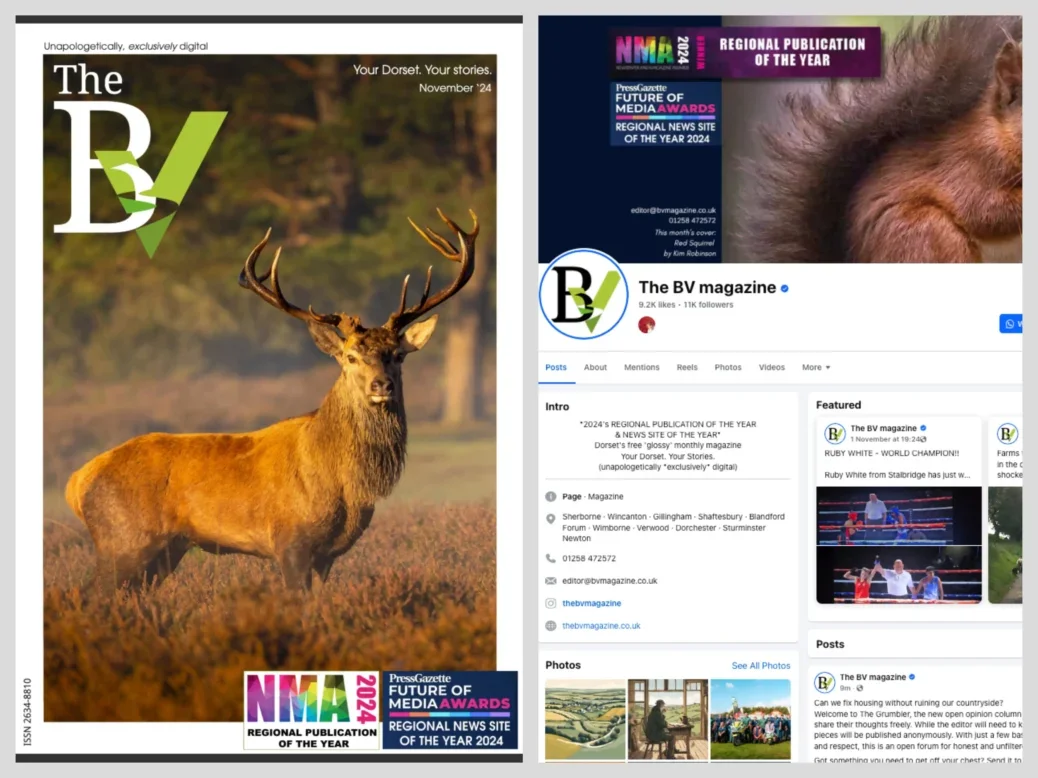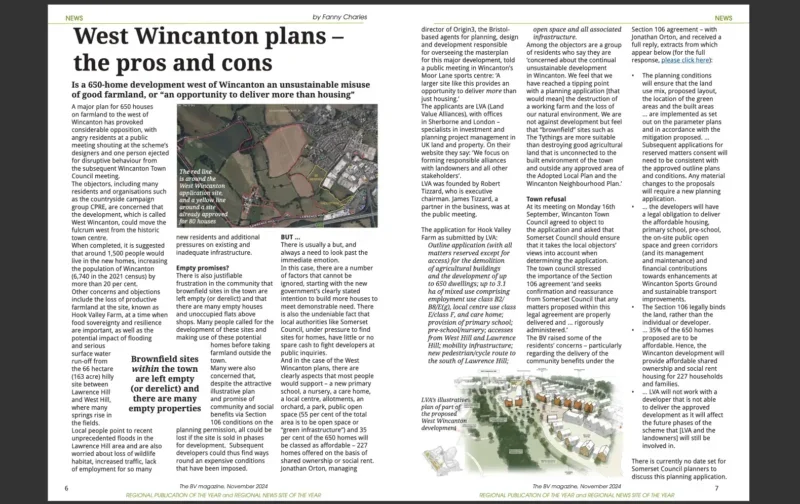
The editor of Press Gazette’s local news website of the year, The BV magazine, says other publishers may not like hearing what’s powered the title’s success.
The digital-only, free monthly magazine for inland Dorset was founded by husband and wife duo Laura and Courtenay Hitchcock in 2020 and today boasts a loyal audience and a brisk trade in advertising.
Speaking to Press Gazette last week following The BV’s Press Gazette Future of Media Awards win in September, Laura Hitchcock said: “My whole ethos, from start to finish, is “I’m my target audience. What do I want? What do I want to read? How do I want to read it? How would I like it to look?…
“And if I’m on Facebook, browsing Facebook, I don’t want to have to go somewhere else… to read that content. I want to read it here.”
Most publishers are moving away from Facebook, burned by years of abrupt algorithm changes and, more recently, a wholesale rejection of the news industry by parent company Meta.
But The BV — short for Blackmore Vale, an area north of the Dorset Downs — has bet on a strategy that sees it upload its content directly to its Facebook page without linking back to its own website at all.
Hitchcock said it means the brand has foregone plenty of immediate revenue, “but our principle is that if the readers are there, the advertisers will follow”.
What is The BV magazine?
The BV launched in August 2020 to fill a gap left by the Reach-owned Blackmore Vale Magazine, which suspended publication following the outbreak of the pandemic in April 2020 before shuttering altogether in the summer. (It is not the only publication to position itself as the original magazine’s successor: a newspaper named The New Blackmore Vale, set up by local removals and self-storage businessman Lloyd Armishaw, launched shortly afterward.)
Courtenay Hitchcock was a photographer and had previously worked in sales, while Laura was a writer with an IT background who had run a parenting website and commercial relationships for a network of bloggers and Instagrammers. The skills they had, she said, led Courtenay to suggest “this stupid idea that we could do a local digital magazine”.
The magazine is uploaded each month to the publication’s website, theblackmorevale.co.uk, where it is immediately available to read in full for free. It is also distributed via a newsletter, and individual articles from each issue are uploaded to the website and Facebook at intervals across the month.
Foregoing print helped The BV reach more of the rural Blackmore Vale population from the start, Hitchcock said, especially because the pandemic had encouraged the region’s older residents online. As a result, she said, “it took off”.
The first fifth or so of each issue of The BV comprises newsier, more long-form journalism focused on local issues. A typical story might look at the benefits and trade-offs of a proposal to build new housing in a small village.
“Even if we’re looking at a negative story, we’ll try and find a slightly positive note to it,” Hitchcock said. “We’re not fluffy, but we also don’t want to be doom and gloom.”

The rest of the content, she said, is columns on “various rural issues” like farming, wildlife and equestrianism, as well as local history and “community news” promoting, for example, charity fundraisers. The Hitchcocks are the publication’s only full-time staff, but it takes contributions and pays two copy editors to proof the content.
The BV’s newsletter has 17,500 subscribers, Hitchcock said. On top of these, between around 26,000 unique readers download the digital magazine directly through the website each month and a further 20,000 readers read the content as website articles.
The BV’s largest distribution channel is its Facebook page, however, where Hitchcock says it reaches 250,000 people a month.
“The traditional thing for most media organisations is to drop a link on social media to get people to come to your website so you can earn on them with the ad revenue,” she said. “But of course, there’s a massive drop off [between who sees the link and who clicks through], because people don’t like coming away from Facebook.
“So we took the decision a couple of years ago that we’ll build the community and our name and our reputation and have the community on Facebook.
“Yes, we’ll lose some ad revenue by working that way, but our principle is that if the readers are there, the advertisers will follow, and they will come and work with us the other way around.
“It’s a slower model, but it works better for us in terms of maintaining our readership and engagement.”
The BV says it’s ultimately making money from its link-free Facebook distribution model
It’s also a model that has worked for The BV commercially, Hitchcock said.
“Being a rural area, community matters, and people feel like they know us and they trust us…
“When we go and talk to people, talk to brands and potential partners and sponsors, then they know who we are, they know what we’re doing, and they’re already keen to work with us because of what they’ve seen us do.”
The BV’s advertisers are mostly local, often higher-end businesses such as law firms and private schools, but she said they have picked up “a couple of national brands” including equestrian equipment vendor Ariat, reflecting the popularity of horse riding in the county.
“People often just want to be on our social media, particularly [advertisers] like events — they see the engagement that we get on our social media and they just want to be there. They’re not even worried about the magazine, sometimes.”
The publisher’s posts regularly receive hundreds of likes and dozens of shares from Facebook users which include The BV’s 10,000 followers.
As well as advertising, The BV has “fallen sideways into event magazines” as a revenue stream, which see The BV put together annual literature for several agricultural shows around the South West.
Hitchcock said the event magazines provide a sideline that is “profitable not only in terms of finances, but also in terms of getting in front of the community and brand awareness”.
Asked what challenges the business faces, Hitchcock said: “Life’s just one long challenge in every direction at the moment, isn’t it?
“It is tricky because we are ridiculously busy, but turnover doesn’t quite [allow] us to employ a third person, which we definitely need. We’re at the point where we have the work, but we need a little bit more turnover before we can employ a third person.”
The stresses, Hitchcock said, were not necessarily unique to journalism: “It feels like you’re just constantly running faster just to stand still, but I think that’s every business owner everywhere… we spend hours every month talking to local business owners, and they’re all saying the same thing, whether they’re a local leather worker or a farmer.”
But, she said, “we cover our bills and have a little left over… It would be nice if there was more, but trying to operate on a tricky model, in a tricky industry, I think we’re doing okay”.
The BV’s editor on Facebook engagement: ‘I’m always aware it’s not ours, and it could be taken’
Many publishers have spent the last few years attempting to reduce their reliance on tech platforms after a decade that saw them become hooked on traffic from the likes of Google and Facebook which has since ebbed away or become more volatile. And although The BV does not rely on Facebook for traffic, the platform provides its largest audience.
Asked whether that gave her any cause for concern, Hitchcock said: “I’m always aware that I don’t own Facebook, I don’t own our community on Facebook and that can be turned off at any time.
“And not just because Facebook has turned it off — if you get scammed, or somebody gets into your page and then it gets turned off, it is gone, and it can take you two, three months to get it back, sometimes. You hear lots of horror stories, and I’m always aware of that.”
To hedge against that, Hitchcock said “we’re always building the newsletter database” as well as the SEO position of the website.
“It’s really important to have those. Whilst the Facebook community is there for the taking, I’m always aware it’s not ours, and it could be taken again.”
Email pged@pressgazette.co.uk to point out mistakes, provide story tips or send in a letter for publication on our "Letters Page" blog
